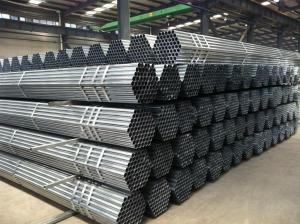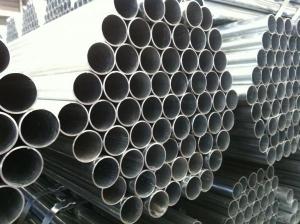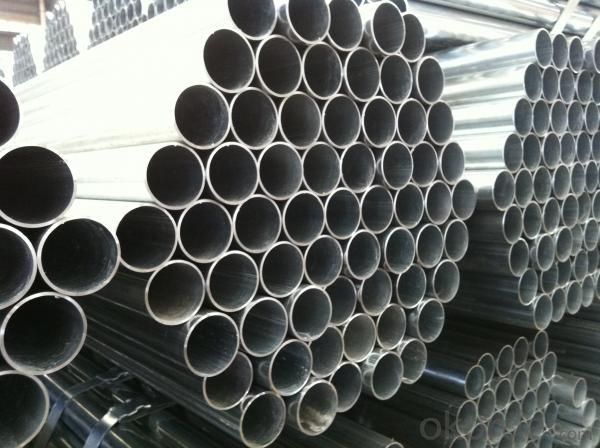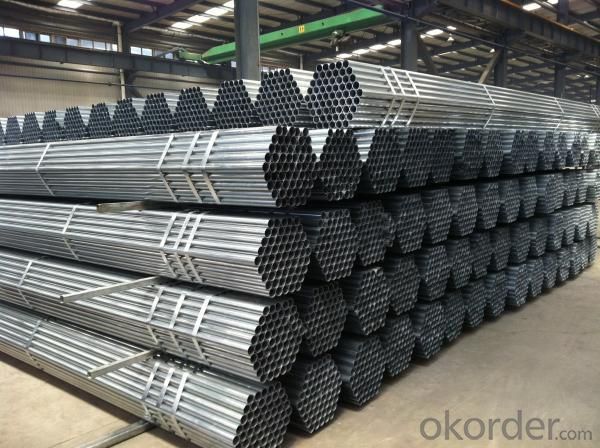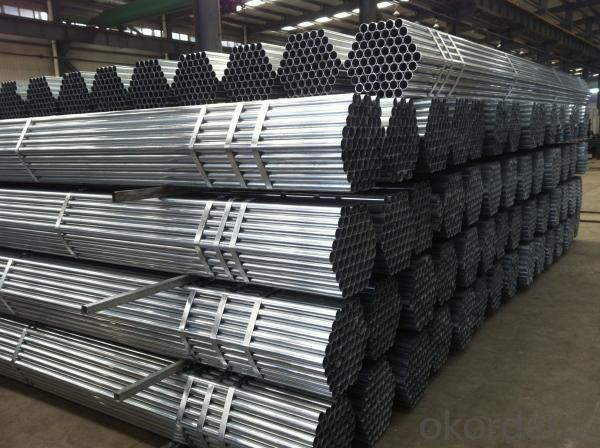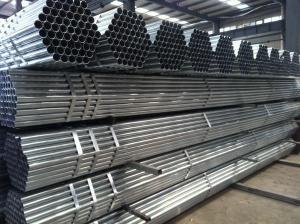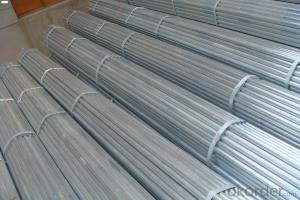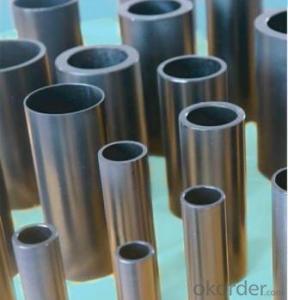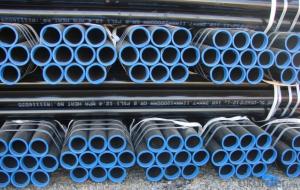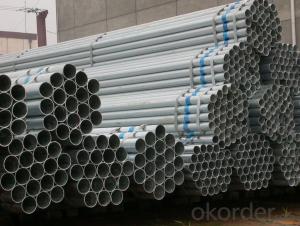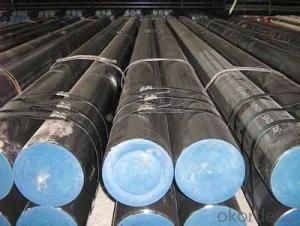Q345 Pre-Galvanized Pipe
- Loading Port:
- Tianjin
- Payment Terms:
- TT or LC
- Min Order Qty:
- 50MT m.t.
- Supply Capability:
- 5000 Tons Per Month m.t./month
OKorder Service Pledge
Quality Product, Order Online Tracking, Timely Delivery
OKorder Financial Service
Credit Rating, Credit Services, Credit Purchasing
You Might Also Like

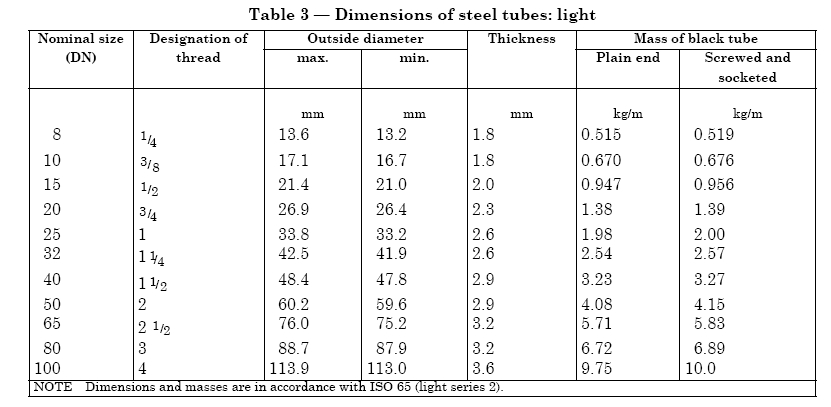
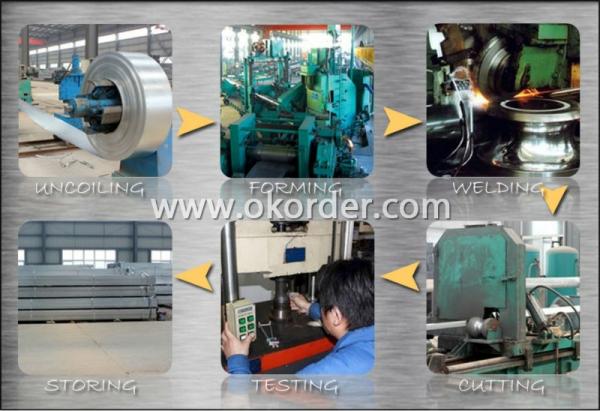
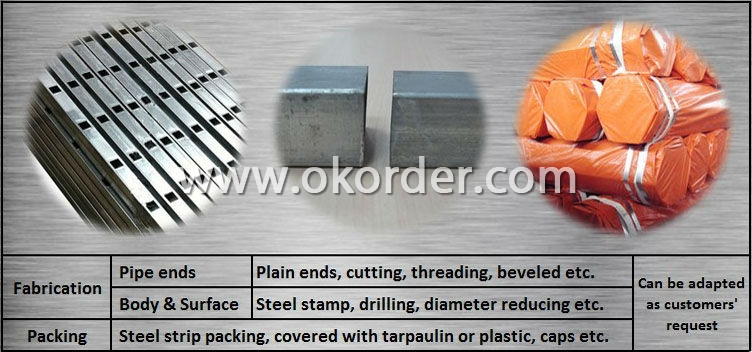
- Q: Can steel pipes be used for the construction of high-rise buildings?
- Yes, steel pipes can be used for the construction of high-rise buildings. Steel pipes offer several advantages such as high strength, durability, and resistance to fire, making them a suitable choice for supporting the structural load and ensuring the stability of tall structures. Additionally, steel pipes can be easily fabricated and installed, providing flexibility in design and construction.
- Q: Are steel pipes suitable for potable water supply?
- Yes, steel pipes are suitable for potable water supply. They are commonly used for water distribution systems due to their durability, strength, and resistance to corrosion. However, it is important to ensure that the steel pipes are properly coated or lined to prevent any potential contamination of the water supply.
- Q: Can steel pipes be used in extremely cold temperatures?
- Indeed, steel pipes are capable of being utilized in frigid temperatures. Renowned for its robustness and endurance, steel proves itself suitable for a plethora of applications, even in the most extreme wintry conditions. Steel pipes exhibit a remarkable resistance to low temperatures, withstanding the detrimental effects of freezing without compromising their structural integrity. Consequently, they prove to be ideal for deployment in industries such as oil and gas, where they encounter sub-zero environments. Moreover, the option to insulate or coat steel pipes further fortifies them against the cold, preemptively averting issues like freezing or cracking. In summary, steel pipes unquestionably represent a trustworthy choice for deployment in exceedingly cold temperatures.
- Q: Is the same specification seamless steel pipe more expensive than welded pipe?
- Welded steel pipe refers to the use of steel or steel plate bending deformation into a round, square and other shapes after welding into the surface of the joint of the steel pipe. The blank used in welded steel pipe is steel or strip steel.
- Q: Can steel pipes be used for oil refinery applications?
- Yes, steel pipes can be used for oil refinery applications. Steel pipes offer many advantages for oil refinery applications including high strength, durability, and resistance to corrosion. They are able to withstand high pressure and temperature conditions that are common in oil refinery operations. Steel pipes are also easy to transport and install, making them a popular choice for oil refinery projects. Additionally, steel pipes can be customized to meet specific requirements such as size, thickness, and coating, making them suitable for a wide range of oil refinery applications.
- Q: What are steel pipes?
- Steel pipes are hollow cylindrical tubes made from steel, which are mainly used for transporting fluids and gases in various industries such as oil and gas, construction, and plumbing. They are known for their strength, durability, and resistance to corrosion, making them an essential component in infrastructure and industrial applications.
- Q: How do steel pipes compare to other pipe materials like PVC or copper?
- Steel pipes have several advantages over other pipe materials like PVC or copper. Firstly, steel pipes are incredibly durable and can withstand high levels of pressure and extreme temperatures, making them suitable for a wide range of applications. Secondly, steel pipes have excellent resistance to corrosion, which ensures their longevity and reduces the need for frequent maintenance or replacement. Additionally, steel pipes have a higher strength-to-weight ratio compared to PVC or copper, making them more robust and capable of handling heavy-duty tasks. However, steel pipes can be more expensive and require special equipment for installation. Overall, steel pipes are a reliable and versatile option that offers superior durability and performance compared to other pipe materials.
- Q: What is the role of steel pipes in the chemical manufacturing industry?
- Steel pipes play a crucial role in the chemical manufacturing industry as they are widely used for transporting various chemicals, gases, and liquids. These pipes are highly durable, resistant to corrosion, and can withstand high temperatures and pressures, making them ideal for handling hazardous substances. Additionally, steel pipes ensure the integrity and safety of the chemical manufacturing process by preventing leaks, contamination, and loss of product.
- Q: How are steel pipes used in the chemical industry?
- Steel pipes are extensively used in the chemical industry for various applications, including transportation of chemicals, gases, and liquids. They are highly durable, corrosion-resistant, and can withstand high pressure and temperature conditions. Steel pipes are used in chemical plants for the transfer of raw materials, intermediate products, and final products within the production process. They are also employed for the distribution of utilities such as water, steam, and compressed air. Additionally, steel pipes are utilized for the construction of storage tanks, reactors, and other equipment in the chemical industry due to their strength and reliability.
- Q: What are the common methods for cleaning the inner surface of steel pipes?
- Some common methods for cleaning the inner surface of steel pipes include chemical cleaning, mechanical cleaning, and high-pressure water jetting. Chemical cleaning involves using solvents or acids to dissolve and remove any contaminants or residue. Mechanical cleaning involves using tools such as wire brushes, scrapers, or pigs to physically scrub and scrape the inner surface of the pipes. High-pressure water jetting involves using a pressurized stream of water to blast away dirt, scale, or other deposits. These methods can be used individually or in combination, depending on the specific cleaning requirements and the condition of the pipes.
The main production and sale of galvanized steel, the thin-walled high-frequency welded pipe, galvanized pipe, square pipe, rectangular pipe, conduit, EMT conduit, greenhouse pipes, galvanized pipes, and other related products, annual production capacity of 40,000 tons. The company has independent export rights.
1. Manufacturer Overview
| Location | Tianjin ,China |
| Year Established | 2004 |
| Annual Output Value | Above 100milion rmb |
| Main Markets | Main land;Middle East;Southeast Asia |
| Company Certifications | ISO 9001 |
2. Manufacturer Certificates
| a) Certification Name | |
| Range | |
| Reference | |
| Validity Period |
3. Manufacturer Capability
| a) Trade Capacity | |
| Nearest Port | Tianjin;Qingdao |
| Export Percentage | 41% - 50% |
| No.of Employees in Trade Department | 21-50 People |
| Language Spoken: | English;Chinese |
| b) Factory Information | |
| Factory Size: | 38000squar meter |
| No. of Production Lines | Above 10 |
| Contract Manufacturing | OEM Service Offered;Design Service Offered |
| Product Price Range | High;Average |
Send your message to us
Q345 Pre-Galvanized Pipe
- Loading Port:
- Tianjin
- Payment Terms:
- TT or LC
- Min Order Qty:
- 50MT m.t.
- Supply Capability:
- 5000 Tons Per Month m.t./month
OKorder Service Pledge
Quality Product, Order Online Tracking, Timely Delivery
OKorder Financial Service
Credit Rating, Credit Services, Credit Purchasing
Similar products
Hot products
Hot Searches
Related keywords
